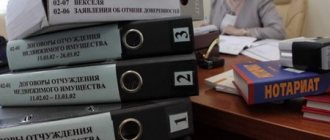What does the concept of “alienation of property” mean?
Note! Alienation of property is the transfer of property or ownership of it from the current owner to another entity.
Important! By default, it is accepted that the alienation of property is a set of actions carried out by its owner of his own free will (for example, on the basis of various transactions).
A systematic analysis of the law allows us to conclude that the alienation of property is not (see paragraph 1 of Article 235 of the Civil Code of the Russian Federation):
- waiver;
- provision of property for temporary use;
- loss or destruction of property or loss of the right to it for objective reasons;
- termination of rights by court decision;
- providing future opportunities for alienation.
Transactions on the alienation of shares: do you need to go to a notary?
When concluding a transaction for the alienation (sale, donation, etc.) of a share in the right of common ownership of a piece of real estate, the question arises: is it necessary to contact a notary or is it enough to draw up an agreement in simple written form. The reason for doubt may be the repeatedly changing legislation in this area. Specialist of the Cadastral Chamber of the Tambov Region Marina Gerasimovich noted the most common situations and told in which cases you will have to contact a notary.
According to current legislation, alienation transactions or mortgage agreements for shares in the right of common ownership of real estate are subject to notarization. However, the law defines exceptions to this rule.
Notarization is not required for the alienation or mortgage of all participants in shared ownership of their shares in one transaction. In this case, a transaction means an agreement. And if, for example, the shares are alienated all at the same time, but under different agreements, then the requirement of “one transaction” is not met. Thus, each agreement will be subject to notarization.
There is no need to contact a notary in the event of alienation of a share from the whole: when the property of the seller or donor is not shared, but individual.
There is also no need to notarize the agreement when alienating an apartment as a whole, if at the same time a share in the right of common shared ownership of a land plot under an apartment building in which such an apartment is located is transferred to the transferee. This is explained by the fact that a share in the right of common shared ownership of a land plot under an apartment building is not an independent subject of the transaction.
There is no need to notarize the transaction for the alienation of land shares. We are talking about a land share in the right of common shared ownership of an agricultural land plot, if the number of participants in shared ownership exceeds five persons. In relation to such land shares, the norms of the Federal Law of July 24, 2002 No. 101-FZ “On the turnover of agricultural land” are applied. If the number of participants in shared ownership of an agricultural land plot is five or less, the general rules of civil law will apply, and then when alienating a share, notarization of the agreement will be required.
Currently, agreements on mortgage of shares in the right of common ownership of real estate concluded with credit institutions, including banks, are not subject to mandatory notarization.
And finally, you definitely need to remember the cases when notarization of the contract cannot be avoided. So, transactions related to the disposal of real estate under guardianship conditions, as well as transactions for the alienation of real estate belonging to a minor citizen or a citizen recognized as having limited legal capacity, are always subject to notarization. There are no exceptions here - the Law protects the rights of persons who are not endowed with the full scope of rights of participants in civil relations.
Forced alienation of property by right of ownership
At the same time, the Civil Code of the Russian Federation contains norms according to which the alienation of property is not always a decision made by the subject of law independently and of his own free will.
Thus, the owner of property that, by virtue of the law, cannot belong to him (for example, if the alienated property is an item related to objects whose circulation is limited, clause 2 of Article 129 of the Civil Code of the Russian Federation), must alienate it within the time limits established by law (Article 238 of the Civil Code of the Russian Federation).
Another situation is when real estate objects located on a land plot seized due to improper use are sold at auction (Article 239 of the Civil Code of the Russian Federation).
Another example is the alienation of property associated with the imposition of a penalty on it. For example, foreclosure on housing that is the subject of a mortgage (Clause 1, Article 50, Articles 51, 55 of the Law “On Mortgage (Pledge of Real Estate)” dated July 16, 1998 No. 102-FZ).
Conclusion! Thus, these actions are performed by the copyright holder himself, albeit in accordance with the mandatory requirements contained in the law.
Documents required by a notary
In addition to the actual agreement on the alienation of a share in one way or another, the notary will need documents confirming:
- ownership of the property by the seller (title agreement, extract from the Unified State Register of Real Estate);
- legal capacity of the parties to the transaction (passports, documents of the organization);
- consent of the guardianship authority to conduct the transaction if the owners are minors or incapacitated persons;
- notarial consent of the spouse to the alienation of the share if it is part of the jointly acquired property;
- a notice from the seller sent to the share owners with an offer to buy out the share.
According to the letter of the Federal Notary Chamber No. 10333/03-16-3 dated March 31, 2016, notification of co-owners about the alienation of a share under a compensated transaction (sale, exchange) is a legally significant message. It can be sent by a notary at the request of the applicant, or the seller notifies other participants in shared ownership independently.
The notice of sale must indicate the object and the sale price, the payment procedure, and the timing of the transfer of property. A competent solution would be to attach a draft purchase and sale agreement to the notice. As confirmation of compliance with the law, you must submit to the notary's office a copy of a registered letter or telegram with notification of delivery to the addressee.
The transaction can be certified after a month from the date of receipt of the notice by the share owners, if no response has been received from them. Previously, a notary could certify a transaction on the alienation of shares only if there was a notarized refusal of the purchase by the co-owners.
Alienation of property of a minor
In this case, the alienation of property is operations also carried out in accordance with the requirements of Art. 26, 28 of the Civil Code of the Russian Federation, which determine the degree of legal capacity of minors depending on their age category.
Note! Transactions with the property of persons under 14 years of age are carried out only by their parents, adoptive parents or guardians (clause 1 of Article 28 of the Civil Code of the Russian Federation), with the exception of small household transactions.
Important! Transactions by minors over 14 years of age are made with the written consent of their legal representatives (Clause 1 of Article 26 of the Civil Code of the Russian Federation), with the exception of cases regulated by law.
Source: RusLawyer
Cost of notarization of a transaction
For performing notarial acts for which the law requires a notarial form, the notary charges a tariff in the amount of the state fee.
The price of the share is established on the basis of agreement of the parties, cadastral value or assessment report. If there are two documents indicating different values, the higher value is taken into account. At the same time, the notary fee for transactions requiring mandatory notarization cannot exceed 20,000 rubles. In addition to the tariff, legal and technical services of a notary (PiTH) are paid. In Moscow, the fee is 6,000 rubles, while minors are exempt from payment in proportion to their participation in the contract.
An additional advantage of having real estate alienation transactions certified by a notary is that, at the request of the parties, he sends documents for registration of the transfer of rights to the Rosreestr body free of charge. At the same time, you can receive an extract from the Unified State Register for the new owner within 24 hours, since a notarized transaction does not require additional verification by Rosreestr.
○ Advice from a lawyer:
✔ I have a share in the apartment, other shareholders are trying to take my share, can they take it away without my consent?
According to Art. 35 of the Constitution of the Russian Federation, no one can seize property without a corresponding court decision. In this case, other shareholders have only one chance - forced redemption. If the court finds that your share in the common property is insignificant, the property may be seized. In such a situation, you will receive compensation equivalent to the value of the share.
✔ I have a 1/5 share in the apartment, another shareholder wants to buy it, but offers very little money. Is it possible to oblige him to buy it back at market value?
It will not be possible to oblige someone to buy property, but you can sell a share at market value. To do this, you must use the procedure for selling your share, taking into account the pre-emptive right. Send the co-owners a notice of the planned sale of the share indicating the market price. If after a month they do not express their desire to buy the share, you can sell it to a third party.
Video
Real estate specialist Inna Belyakova will tell you how you can legally deprive the owner of a share in an apartment.
Published by: Vadim Kalyuzhny , specialist of the TopYurist.RU portal
Entry into the Unified State Register of Legal Entities
After the actual alienation of a share in the authorized capital of an organization, data on this must be entered into the Unified State Register of Legal Entities. Documents evidencing the alienation must be submitted to the relevant authorities by a notary. He must submit an application to make changes to the Unified State Register of Legal Entities no later than two days after the alienation transaction has been certified. A copy of this statement must subsequently be submitted to the LLC. This transfer must be carried out within three days after the transfer of rights to the alienated share.
That is, neither the buyer nor the seller is required to take any action to transfer data to the registrar. This responsibility rests entirely with the notary who certified the alienation transaction. He sends the documents himself and then reports them to the public.
Registration of land share ownership and its registration
To register the allocated share, it must be transferred to a new status - as a separate land plot.
Based on the survey document and the title document for the land share, the plot is registered in the cadastral register with the territorial body of Rosreestr. However, the assignment of a cadastral number is not yet sufficient to transform an object into independent real estate.
The owner's rights come into force only after the right to the land plot is registered with the registration chamber. Upon registration, a corresponding Certificate is issued. Then you can obtain a cadastral passport for the plot.
When allocating a share of a land plot, the right of common ownership is terminated, since it results in the creation of two or more separate plots with different owners. It is also possible that several or even all participants in shared ownership register their shares at the same time.
What areas can be divided into shares?
Land plots, according to the legislation of the Russian Federation, can be divisible and indivisible.
Divisible are those areas that, when divided, do not lose their essential characteristics and can continue to be used for their intended purpose. For example, to remain suitable for construction, running a personal subsidiary or agriculture, carrying out business activities, etc. Divided plots can be in shared or joint ownership, and joint ownership can be transformed into shared ownership by allocating the shares of individual entities.
indivisible plots into separate shares without causing irreparable harm to their rational use for their intended purpose and loss of their value. If the division leads to a violation of town planning regulations, sanitary and fire safety standards, environmental requirements, or the area of the newly formed plots is less than the standards established by local authorities for the corresponding type of intended purpose, then it is not subject to division. Thus, the plot on which an apartment building or agricultural building is located may be indivisible. For them, if there are two or more owners, only the right of joint ownership is applicable.










